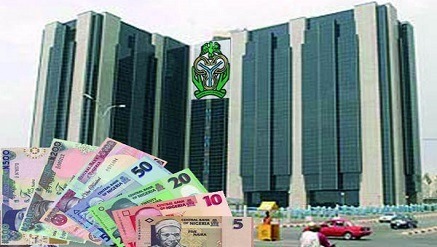E-Financial
N400Bn Bad Debt: Banks to Publish Names of Debtors by August 1

About N400 billion bad debt outstanding in the banking sector is causing panic in the industry and most of the debtors are individuals who have the capacity to pay but have refused to do so.
Following this development, the Central Bank of Nigeria (CBN), and Deposit Money Banks in the country have concluded plans to publish the list of such debtors starting from August 1, 2015.
Mrs Tokunbo Martins, director, Banking Supervision, CBN, who spoke tojournalists on the outcome of the 322 Bankers Committee meeting in Abuja said that “You will recall that at the last Bankers Committee meeting, we discussed about publishing the names of serial debtors of banks.
“We discussed this again because of the fact that the date is drawing close. Last time we had the meeting, we said that there should be three months of grace to give the debtors the opportunity to put the facilities back to performing status.
“So, by the 1st of August, any debtor that hasn’t done so, the name will be published by the bank. So, the banks are encouraged to speak to their customers that fall into that category that they should put in more effort to pay off,’’ she said .
Martins said that the total credit currently in the system was between N13 and N14 trillion and about three per cent of it was non-performing.
She stressed that banks had an upper limit target of five per cent.
On the electronic banking space, Mr Phillip Oduzua, chief executive of UBA, said that 12.5 million customers had been enrolled on the Bank Verification Number (BVN) exercise.
“We believe that this is a substantial mileage that we have made and there is still room to close the gap knowing that the deadline for everybody to enrol is June 30th.
“In the event that any customer is not enrolled, it is possible that the customer may not be able to enjoy a lot of the banking services.
“As such, we will urge all customers of banks to enrol so that they would continue to enjoy unhindered services from the banks,’’ he said.
According to him, customers who fail to enrol may not enjoy credit facilities, foreign exchange services and internet banking, among others.
On cashless policy, Oduzua said with the progress made so far, the policy would be extended to every part of the country before the end of third quarter.
On the foreign exchange market, Mr Jubril Aku of Ecobank said that the committee reviewed the sector and would continue to partner CBN to meet legitimate needs of customers.
“There are some demands that raised concerns, so sometimes when such request are made, we make analysis and see the effect on the economy.
“As long as they are legitimate demands, we will make sure it is met. So, the committee is satisfied with the stability attained and will continue to look at the sector critically,’’ he said.
Henry Semenitari, chief executive officer of Unity Bank, said the committee also reviewed the enhancement witnessed in the credit culture in the sector.
He said that the culture would now be extended to other financial institutions of Insurance and non-banking institutions within the banking space.
“As the culture continues to improve, the requisite data that will lead to uninformed judgement in terms of given credit to businessmen will become easier and control effective.
“So, what we will require or implore people to do is to provide the necessary Know-Your-Customer (KYC) to their banks to ensure they are registered through the credit registry as well as other banking and non-banking financial institutions,’’ he said.
Semenitari said that this would help to stabilise and institute a sound culture of credit that would be relevant to the economy and in consonance with financial inclusion policy.
E-Financial
EFCC Drags Cititrust to Court over Unreported ₦200mTransfers

Federal High Court in Lagos has fixed July 1, 2025, for the commencement of trial in a money laundering case involving Cititrust Holdings PLC and three of its subsidiaries.

The subsidiaries are Cititrust Funding PLC, Cititrust Credit Limited and Cititrust Financial Services Limited,
The companies are facing an eight-count charge filed by a team of prosecutors from the Economic and Financial Crimes Commission (EFCC), comprising Anasoh Henry Onyekachi, Frankklin Ofoma, Abdulhamid Lamido Tukur, and A.A. Usman.
According to the charge, between 2021 and 2023, the companies, all incorporated in Nigeria, allegedly operated investment management services without a valid licence from the Central Bank of Nigeria (CBN).
This act contravenes Section 57 of the Banks and Other Financial Institutions Act (BOFIA) 2020 and is punishable under Section 57(5) of the same legislation.
The prosecution also alleged that the companies conducted a Collective Investment Scheme without registering with the Securities and Exchange Commission (SEC), another violation of regulatory requirements.
In one of the counts, Cititrust Credit Limited is specifically accused of failing to report high-value financial transactions to the Nigerian Financial Intelligence Unit (NFIU).
These transactions include a N20 million transfer on January 7, 2021; a N200 million transfer on April 4, 2021; and a N200 million lodgement on January 29, 2021.
Additionally, both Cititrust Credit Limited and Cititrust Financial Services Limited are alleged to have made a single transfer and lodgement respectively of N42 million into their bank accounts on January 29, 2021, without proper disclosure to relevant authorities.
The alleged offences are in breach of Sections 11(1)(b) and 11(3) of the Money Laundering (Prohibition) Act 2022, as well as Section 54(1) of the Investment and Securities Act 2007, and are punishable under the respective laws.
The court is expected to begin full proceedings on July 1.
E-Financial
S&P Global Ratings Downgrades Ecobank Nigeria’s Credit Rating to CCC-, Outlook Negative

Ecobank Nigeria’s long-term issuer credit rating has been downgraded to ‘CCC-’ from CCC, with the outlook placed at negative by S&P Global Ratings. This is a resultant effect of the $150 million bond buyback offer on the bank’s $300 million Senior Unsecured Eurobond.

Part of the tender offer made by Ecobank includes an early tender premium of $12.50 for every $1,000 in principal (equivalent to 1.25%), with the anticipated settlement date set for July 8, 2025. The offer also requests bondholders’ consent to eliminate the capital adequacy covenant on the outstanding notes.
These actions also led S&P to downgrade the $300 million Eurobond from ‘CCC’ to ‘CCC-’. Although S&P notes that it does not consider the tender offer a distressed debt restructuring.
However, this assessment is at risk of changing if the bank does not receive the promised capital injection from the parent group, Ecobank Transnational Incorporated (ETI).
Following the naira devaluation, Ecobank was unable to meet the regulatory Capital Adequacy Ratio (CAR) requirement, as its CAR dropped to 7 per cent. This was below the 10 percent regulatory minimum. The breach of the CAR caused the bank to seek the consent of its bondholders to pause the capital adequacy notes on the Eurobond notes till September 2025.
Following this development, the bank received a $50 million prepayment on promissory notes from its parent company, ETI, along with early repayments on certain foreign currency loans. However, it has been insufficient in restoring the capital adequacy to regulatory levels.
According to S&P, the bank is expected to receive another $50 million capital injection from its parent group before August 2025. However, the ratings agency notes that if the bank is unable to receive this capital injection, it will inevitably default on its bonds. A situation that would cause a further downgrade to ‘CC’.
It was recommended that Ecobank Nigeria consider raising $150 million through additional Tier-1 instruments to strengthen its liquidity buffers. Additionally, the bank was advised to intensify efforts to recover its foreign currency-denominated loans.
E-Financial
Fidelity Bank Uplifts Old People’s Home with Essential Items Donation

Fidelity Bank Plc, leading financial institution has reaffirmed its commitment to corporate social responsibility with the donation of food and essential items to the Old People’s Home in Yaba, Lagos.

The donation was made possible through the generosity of the bank’s Nexus Inductees Class, under its Corporate Social Responsibility initiative known as the Fidelity Helping Hands Programme (FHHP).
Through the FHHP, staff across Fidelity Bank branches nationwide identify crucial interventions needed in their immediate community and raise funds to execute them. The bank’s management then matches this contribution with an equal amount and disburses it for the selected project.
Commenting on the donation, Divisional Head, Brand and Communications, Fidelity Bank Plc, Dr Meksley Nwagboh, emphasized the bank’s unwavering commitment to impacting its host communities positively noting that the community is an essential part of the bank success story.
“Today’s donation is a token of our appreciation for our incredible parents and guardians who have raised outstanding individuals that trust us with their banking needs.
“Our donation to the Old People’s Home reflects our deep commitment to supporting the well-being and dignity of our senior citizens.
“We are honored to contribute to a cause that ensures they receive the care, comfort, and respect they deserve.” Nwagboh stated.
Appreciating the gesture from the bank, the Director-in-Charge of the Home in Yaba, Adetutu Ipaye, said “Community support initiatives such as this from Fidelity Bank is vital to sustaining our mission and enhancing the quality of life for the elderly.
“We urge other organizations to follow in the Bank’s footsteps as this kind of support will go a long way to ensure that the elderly live with dignity and comfort”.
One of the beneficiaries from the home, Mr. Kamoru Adeyetu noted that, “Your presence today has brought us immense joy, and our greatest happiness lies in seeing the younger generation thrive. Beyond the gifts, your visit means the world to us and please remember to visit us regularly.”
Ranked among the best banks in Nigeria, Fidelity Bank Plc is a full-fledged Commercial Deposit Money Bank serving over 9.1 million customers through digital banking channels, its 255 business offices in Nigeria and United Kingdom subsidiary, FidBank UK Limited.
The Bank is the recipient of multiple local and international Awards, including the 2024 Excellence in Digital Transformation & MSME Banking Award by BusinessDay Banks and Financial Institutions (BAFI) Awards; the 2024 Most Innovative Mobile Banking Application award for its Fidelity Mobile App by Global Business Outlook, and the 2024 Most Innovative Investment Banking Service Provider award by Global Brands Magazine. Additionally, the Bank was recognized as the Best Bank for SMEs in Nigeria by the Euromoney Awards for Excellence and as the Export Financing Bank of the Year by the BusinessDay Banks and Financial Institutions (BAFI) Awards.

 Telecom2 days ago
Telecom2 days agoLebara, New Operator Enters Nigerian Telecom Arena, Sells Minutes, Not Airtime

 E-Business2 days ago
E-Business2 days agoOver 7m Streaming Accounts’ Credentials were Leaked in 2024 – Report

 General News23 hours ago
General News23 hours agoOpenAI Unveils New AI Agent for Software Developers

 E-Financial2 days ago
E-Financial2 days agoFidelity Bank Uplifts Old People’s Home with Essential Items Donation

 E-Financial2 days ago
E-Financial2 days agoS&P Global Ratings Downgrades Ecobank Nigeria’s Credit Rating to CCC-, Outlook Negative

 Telecom2 days ago
Telecom2 days agoPIN Pushes for Equitable Digital Governance at World Internet Forum

 Telecom3 days ago
Telecom3 days agoMTN Says New N6.98 USSD Charge Won’t Affect Airtime Recharge

 Telecom23 hours ago
Telecom23 hours ago15 African Startups Using AI Selected for Google Accelerator Cohort 9
























